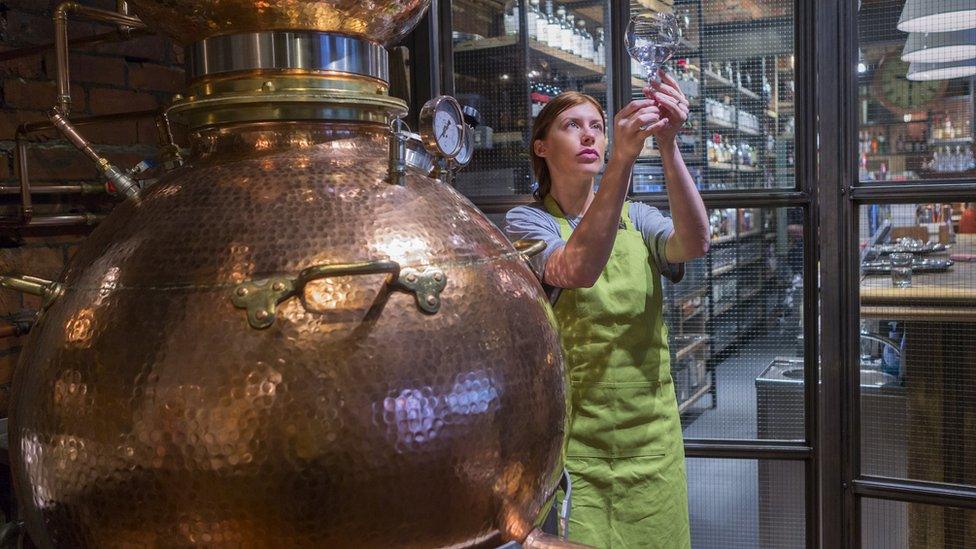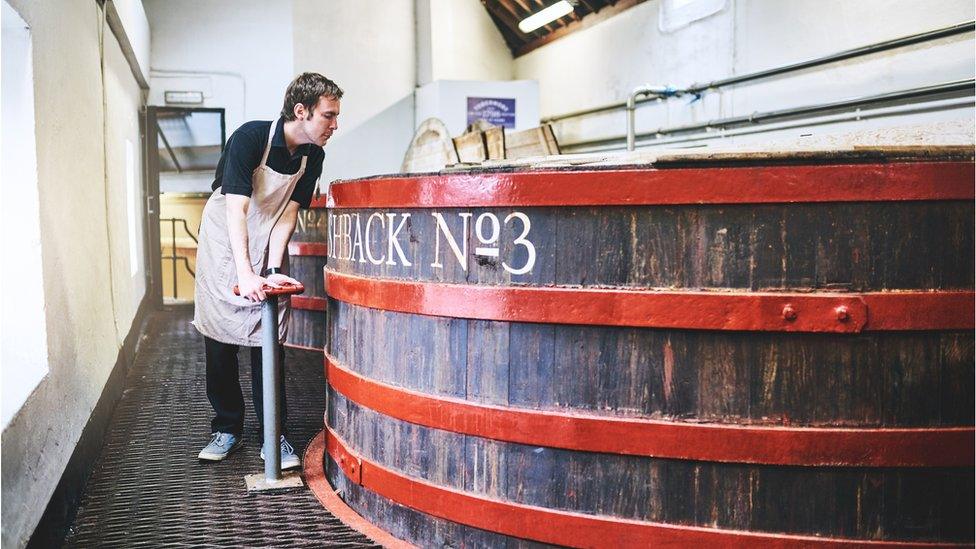Cask Conditioned
- Published

High productivity in the whisky industry looks good because it reflects on the relatively small number of people employed.
It raises the question of whether the Scottish economy gets a fair share of the economic value generated by Scotch.
Competitors would like to break the global dominance of Scotch. In the USA, that starts with challenging the definition of whisky.
Would it harm, or possibly help, the Scotch distilling sector if lower quality products, matured for less than three years, were to enter the market.
Raising productivity is one of the top priorities for the Scottish and British economies.
So surely we should be celebrating one of the most productive industries of all?
Scotch whisky, according to the industry's figures published on Tuesday, is immensely productive, delivering caskfuls of value per worker in the industry.
But hang on. Where does that value go? To those workers? Well, er, no.
Being one of the tiny number of people required to run the average distillery is a quality job, with good prospects, but it's not an obvious way to get rich. Nor is driving one of the distillers' trucks, or turning the casks in the whisky bonds.
For all that this industry generates £5.5bn of gross value added, and £4.7bn of export value last year, it directly employs 10,500 people in Scotland.
There are those doing nicely out of supplying the barley, the copper stills, the packaging and, increasingly, the distillery tours.
Water tax
The more valuable jobs within the distilling industry tend to be in the marketing operations, which tend, in turn, to be outside Scotland. And the profits from these operations are largely distributed to foreign corporations.
Around 80% of the industry is controlled from outside Scotland, so that's where the profits go.
It's what you get with an open economy. The same can be said of the (also very highly productive) oil and gas industry.

That's not to say it's a bad thing. It's better to have a high productivity distilling industry than a low one. But it's not necessarily the kind of productivity that the economy needs.
And perhaps inadvertently, it brings back the question of whether Scotland gets as much value from Scotch as it could or should.
I asked the question for a documentary more than five years ago, in which former bank and economic agency boss Sir George Mathewson, said there should at least be some consideration given to a tax on the water used by the industry, without which it couldn't use the valuable "Scotch" brand.
The industry's response: why on earth would anyone take such a successful product and undermine its success?
"Unwarranted"
The Scotch Whisky Association, representing the major distillers, is also keen to point out that having unique provenance in Scotland may be valuable, but don't think there aren't competitors eager to grab market share, or to undermine Scotch's global dominance.
Among them are the big American distillers. The owner of Jim Beam has become a significant investor in Scotch. But in Kentucky and Tennessee, they would like to tackle one of the non-tariff barriers to trade that Scotch enjoys.
By lobbying fiercely in Brussels, it has got the European Commission to ensure protection for its branding is locked in across many markets around the world. And if you want to sell a product called whisky or whiskey in Europe - and by extension, other markets such as Russia and Israel - you're going to have to mature it for at least three years.

The European Commission, on evidence so far, has been pretty robust in forcing trading partners to accept that definition.
It's biggest trading partner, and rival for market share, the United States of America, thinks it is "unwarranted". It said so in a document recently published by the US Trade Representative - the agency that negotiates on trade on behalf of President Trump.
This document is a regular publication entitled the National Trade Estimate Report on Foreign Trade Barriers, external. It runs to more than 500 pages, covering every national and supra-national trade partner, listing the items where Washington wishes to break down tariffs and non-tariff barriers, notably including government procurement practices.
For anyone still thinking trade deals can be done easily and quickly, it's well worth a scan, if only for a reality check.
Grievances
The European Union merits 41 pages. Its approach to food production gets lengthy attention. Airbus subsidies get special emphasis, and there is close interest in proposed measures to police the internet.
One of very few paragraphs with a particularly British flavour is the one on whisky. And because it's only one paragraph, here it is in full:
Distilled Spirits Aging Requirements
The EU requires that for a product to be labeled "whiskey" (or "whisky"), it must be aged a minimum of three years. The EU considers this a quality requirement. U.S. whiskey products that are aged for a shorter period cannot be marketed as "whiskey" in the EU market or other markets that adopt EU standards, such as Israel and Russia. The United States has a long history of quality whiskey production, particularly by micro-distillers, which has not entailed minimum aging requirements, and views a mandatory three-year aging requirement for whiskey as unwarranted. Recent advances in barrel technology enable U.S. micro- distillers to reduce the aging time for whiskey while producing a product commensurate in quality. In 2017, the United States continued to urge the EU and other trading partners to end whiskey aging requirements that are restricting U.S. exports of whiskey from being labeled as such.
The EU and US are about to lock horns once more on getting to a free trade deal. Across the range of US grievances with EU non-tariff barriers to trade, this one may not feature all that prominently.
But cast your mind forward to Dr Liam Fox's plans to get a speedy deal with the USA for a post-Brexit UK. As this is one of few specifically UK issues raised by the US Trade Representative, it's likely to feature high on the list of demands from Robert Lighthizer, the UK trade secretary's opposite number in Washington.
Will London give in, in the interests of securing more important gains? That's up to the negotiations. As we've already seen in Brexit talks, these are rarely evenly balanced. The US will be in a much stronger negotiating position.
Will it be a disaster for Scotch whisky if the international definition is weakened? Well, possibly not, if it results in some whiskies coming to the international market with significantly poorer quality - meaning the "Scotch whisky" branding becomes all the more important to signify longer-matured quality.
After all, the law would surely still require whisky produced in the UK to stick to the current definition.
- Published30 April 2019
